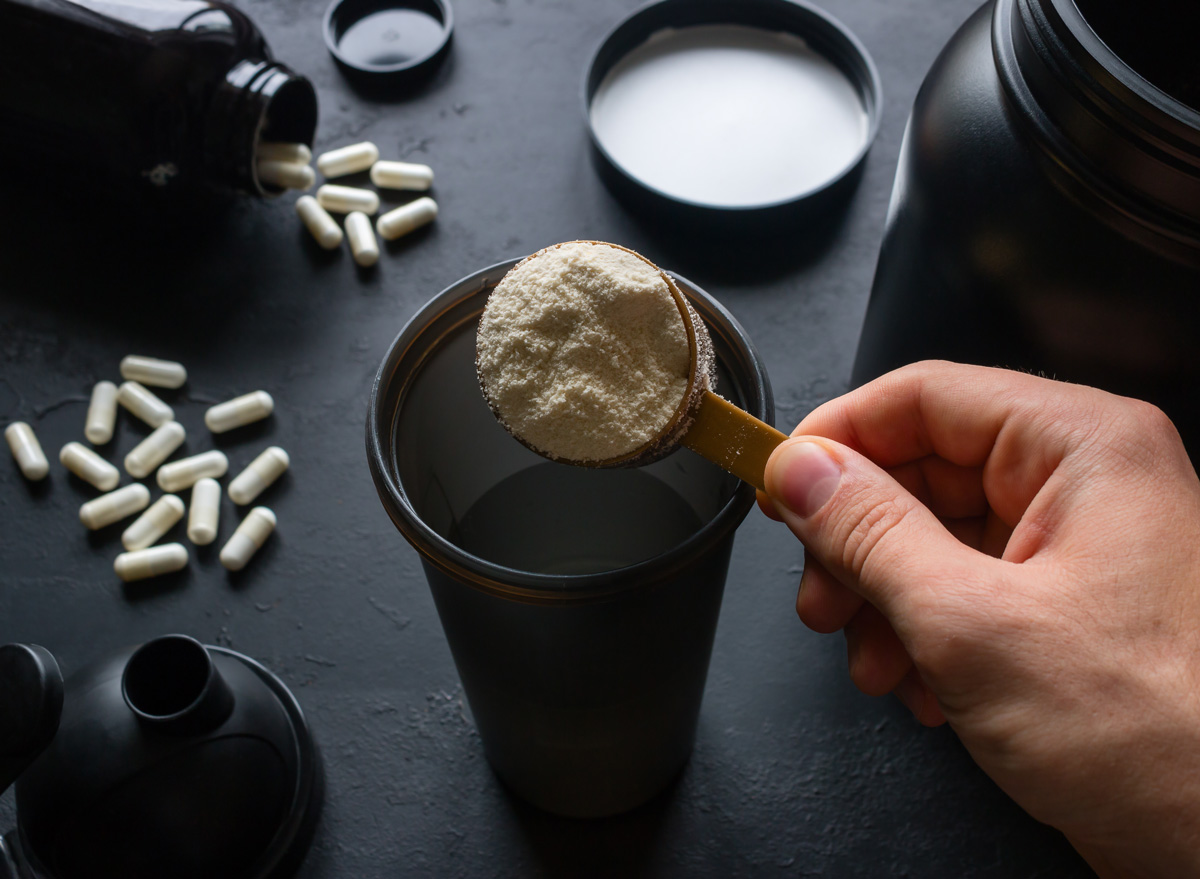We Asked Experts If Ketone Supplements Actually Help You Stay In Ketosis

The bacon-friendly, full-flavor keto diet is one of the most popular diets of the year because of its impressive weight loss benefits. But one of the biggest challenges keto dieters have is getting to and maintaining ketosis. And that's where ketone supplements come in.
These supplements are everywhere on social media. They're being hawked by influencers and keto dieters alike. They claim to kick you into ketosis faster and keep you in it longer. But do ketone supplements really work? And what exactly are they?
We asked two registered dietitians to break it down. They explain what they are, if they work, and—more importantly—whether they're safe.
Why do you want to stay in ketosis on the keto diet?
"The ketogenic diet is a very low carb (limited at 40-60 grams/day), high fat (80%+ of calories from fat) and moderate protein diet designed to force the body into a fat-burning state called 'ketosis.' In ketosis, your body uses an alternate energy source—ketone bodies—to fuel the brain," says Seattle-based registered dietitian Ginger Hultin, MS, RDN, spokesperson for the Academy of Nutrition and Dietetics and Owner of ChampagneNutrition®.
On the keto diet, the body is forced to break down fat rather than using glucose, or sugar, for fuel.
"When glucose (blood sugar) is depleted, your body creates ketone bodies. These can cross the blood/brain barrier as energy for the brain and central nervous system," says Hultin.
What are exogenous ketones (EKs), and how do they help you stay in ketosis?
"Exogenous means 'outside of the body.' These ketones are meant to supplement the effect of a ketogenic diet by providing a boost of ketones in a pill or powder form," says Jes Harvey MS, RD, registered dietitian and owner of The Keto RD. "They are synthetic or naturally-derived ketones."
There is some research that EKs can raise your ketone levels in the body, possibly helping you get in and stay in ketosis more easily.
"This is a hard subject to be concrete on. Each person will go in and out of ketosis at different levels of carbohydrate intake, so it's hard to specifically recommend a person take a specific amount of ketones to get a certain amount of results. It differs so much per person," says Hultin.
What are the different types of EKs?
There are two different types of EKs.
Ketone salts
"Ketone salts are created by adding beta hydroxybutyrate to an electrolyte mineral (most commonly sodium, potassium, calcium, and magnesium)," says Harvey. This specific exogenous ketone supplement is widely available for purchase and comes in different forms: pills, powders, and beverages.
According to Harvey, some of the pros of ketone salts include:
- rapidly inducing therapeutic ketosis
- they're affordable and can be purchased online
- replenishing lost electrolytes
Ketone esters (raspberry ketones)
"Ketone esters are synthetic, as well as more potent and more expensive," says Hultin.
Specifically, ketone esters are created by adding either betahydrxybuterate or acetoacetate to the backbone molecule held together by an ester bond.
"The goal is that the molecule can elevate ketones even further," says Harvey.
Adds Hultin, "You may hear them called 'raspberry ketones', and they're often sold as natural fat burning supplements."MCT oil falls into this category, too, in some ways as it can help fuel ketosis."
According to Harvey, the pros of ketone esters include:
- most potent form of ketones, which elevates ketones to higher levels and for longer periods of time
- greatest potential for anti-seizure/therapeutic purposes (if on the keto diet for epilepsy)
- no concerns with excess electrolyte minerals, as it isn't bound to sodium or magnesium.
What does the research say about ketone supplements?
There is some positive research supporting ketone supplements, specifically for epilepsy and mental health.
- A 2019 study found that taking a combination of ketone ester and medium-chain triglyceride oil reduced tonic-clonic seizures.
- And a 2019 review of ketone supplements for treatment of psychiatric disorders, such as bipolar disorder, depression, schizophrenia and autism found that elevated ketone bodies may help decrease various symptoms.
But when it comes to weight loss, unfortunately, there isn't that much research out there yet.
"It's hard to truly understand their role in human health because the current research is limited," says Hultin. "Studies on humans are generally small, so there's a lot more we can learn about EKs."
One of these small studies includes a 2017 study of 15 people. Researchers found that those who drank ketone esters experienced 50 percent decreased hunger.
The current research is promising, but we'll need to wait for long-term studies to draw conclusions.
Are there any side effects of using EKs?
The benefits are up in the air, but we do know about some risks of exogenous ketones.
First, it should be noted that the Food and Drug Administration (FDA) does not regulate the exogenous ketone supplement market. Keeping that in mind, it's important to read labels with any supplement, and should consult a medical professional or dietitian before trying.
"If ketones are attached to electrolytes, you could be getting higher levels of electrolytes than you want. Particularly, we're concerned about potassium, which can interfere with some medical conditions (heart and kidney specifically)," says Hultin.
Other negative side effects include stomach issues and discomfort like nausea and diarrhea, as researched in a 2017 study on cyclists.
Bottom line: are ketone supplements worth buying and using?
"Bottom line is that your body will naturally go into ketosis if your carb intake is low enough," says Hultin. "Ketone supplements alone won't put you in ketosis. I see a lot of people taking ketone supplements or even vitamins marketed towards those on a ketogenic diet thinking that they can still eat carbohydrates at higher levels and be in ketosis. That's not the case."
You'll be disappointed if you're looking to enhance keto diet results solely by taking pills.
"EKs are not a replacement for being in a natural ketotic state; however, it could possibly complement the diet," says Harvey.
"The ketogenic diet has been around for hundreds of years and many are successful at being in a natural state of nutritional ketosis without the use of exogenous ketones," says Harvey. "I think the research is promising and exciting, but EK's are not required to be successful with the keto diet."







